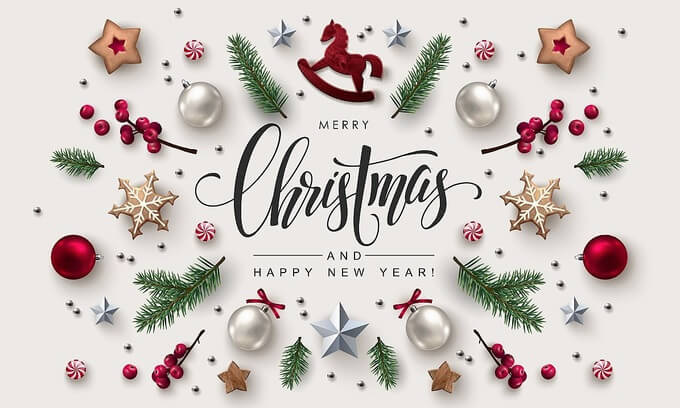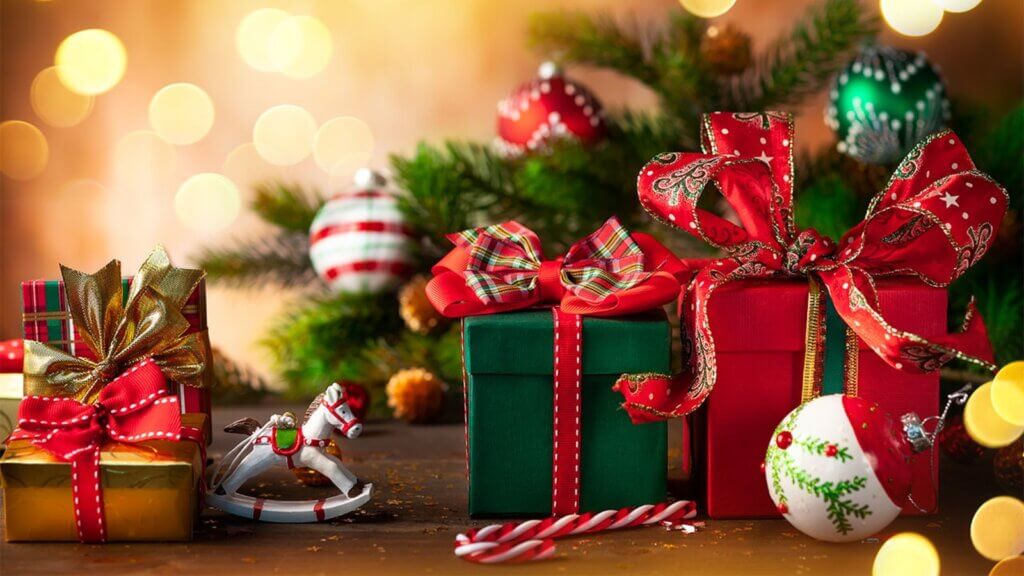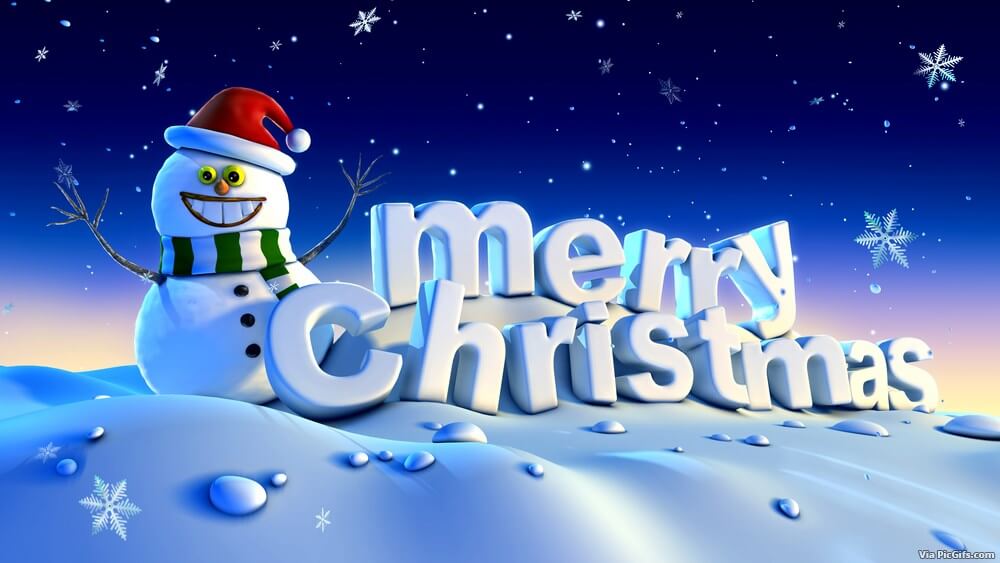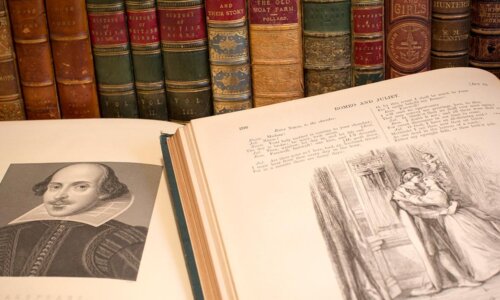Ngày hôm nay, tailieuielts.com sẽ gửi đến các bạn bài viết Từ vựng tiếng Anh chủ đề Giáng sinh. Hãy cùng tìm hiểu nhé!

Nội dung chính
1. Từ vựng tiếng Anh chủ đề Giáng sinh
1.1. Đồ trang trí Giáng Sinh
- Ornament /’ɔ:nəmənt/: vật trang trí (được treo trên cây thông Giáng sinh)
- Christmas card (ˈkrɪs.məs ˌkɑːrd): thiệp Giáng sinh
- Christmas stocking (krɪsməs ˈstɑːkɪŋ): tất Giáng sinh (chiếc tất rộng treo cạnh lò sưởi, treo đầu giường và trang trí trên cây thông, người ta tin rằng khi viết điều mong muốn để trong tất thì ông già Noel sẽ bỏ quà vào chiếc tất đó).
- Christmas tree (ˈkrɪsməs tri:) hoặc Pine (paɪn): cây thông Noel. Cây thông được xem là một trong những biểu tượng của Giáng sinh với ngôi sao trên đỉnh và các đồ trang trí khác.
- Spruce (spruːs): cây tùng. Đây là loại cây cùng họ với cây thông.
- Candle (ˈkændəl): nến
- Ribbon (ˈrɪbən): dây ruy băng
- Tinsel (ˈ tɪn.səl) : dây kim tuyến
- Fairy lights (ˈ fer.i ˌlaɪts) : đèn nháy
- Bell (bel): chuông
- Wreath (riθ): vòng hoa
- Mistletoe (ˈmɪsəltoʊ): cây tầm gửi
- Snowflake (’snəʊ.fleɪk): bông tuyết
- Card (kɑ:rd) : thiệp chúc mừng
1.2. Ngày Giáng Sinh
- Christmas (ˈkrɪsməs) : là lễ Giáng Sinh , tên này được hình thành bởi 2 từ: Christ là tước hiệu của chúa Jesus, còn chữ Mas nghĩa là thánh lễ. Christmas còn thường được viết tắt là X-mas (‘eksməs) hay Noel (noʊˈel) cho gần gũi.
- Winter (ˈwɪnt̬ɚ): mùa đông
- Santa Claus (ˈsænt̬ə klɑːz) hay Father Christmas (ˌfɑːðə ˈkrɪsməs): ông già Noel. Ngoài tên này, ông già Noel còn thường được gọi bằng một số tên khác như: Santa (ˈsæntə), Kris Kringle (ˌkrɪs ˈkrɪŋɡl),
- Reindeer (ˈreɪndɪr): con tuần lộc
- Santa sack (ˈsæntə sæk): túi quà của ông già Noel
- Gift/ Present (ɡɪft) /(ˈprezənt): quà tặng
- Sled/ Sleigh (sled) / (sleɪ): xe trượt tuyết
- Elf (elf): chú lùn
- Snowman (’snoumən): người tuyết
- Fireplace (’faɪə.pleɪs) : lò sưởi
- Scarf (skɑ:rf) : khăn quàng
- A carol(ˈkærəl): một bài hát thánh ca hoặc bài hát không tôn giáo về Giáng sinh
- A White Christmas (ˌwaɪt ˈkrɪsməs): tuyết rơi vào ngày Giáng sinh hay còn được gọi là ngày Giáng sinh trắng
- Church (tʃɜːtʃ): nhà thờ
1.3. Đồ ăn truyền thống
- Turkey (ˈtɜːki): gà Tây
- Gingerbread man (ˈdʒɪndʒəbred mæn): bánh quy gừng hình người
- Candy cane (ˈkændi keɪn): cây kẹp hình gậy (nhiều màu sắc)
- A pudding(ˈpʊdɪŋ): một món đồ tráng miệng được làm bằng trái cây khô ngâm trong rượi, được ăn trong ngày Giáng sinh
- Eggnog (ˈeɡ.nɑːɡ): đây là đồ uống truyền thống vào ngày Giáng sinh. Đồ uống được làm từ kem hoặc sữa, trứng đánh tan, đường và 1 ít rượu
- Hot chocolate ( hɒt ˈtʃɒklət) : socola nóng
- Cookie ( ˈkʊki) : bánh quy
Xem thêm bài viết sau:
- Từ vựng tiếng Anh chuyên ngành Văn học
- Từ vựng tiếng Anh về phương tiện giao thông
- Tổng hợp từ vựng tiếng Anh chủ đề Không gian – Vũ trụ
2. Thành ngữ tiếng anh về Giáng Sinh

Bah Humbug
one of the great quotes from the Charles Dickens story “A Christmas Carol”. This is used by people who do not feel the joy of Christmas that others feel. – những người không cảm nhận niềm vui Noel
Ví dụ:
- Merry Christmas Sir! Bah Humbug..go away!!
Cut someone to ribbons
to judge or criticise someone or something harshly – chỉ trích ai đó
Don’t Look a Gift horse in the mouth
this is used when somebody gets a gift or something for free even though they might not find it so useful. They are expected to be grateful. – biết ơn khi nhận được quà dù nó không cần thiết
Ví dụ:
- Michael got a pair of gloves from his Aunt for Xmas. He was hoping to get some money. His mother told him to be more grateful and not to look a gift horse in the mouth.
The More the Merrier
usually an expression when more people turn up to your party than you expected or some unexpected visitors turn up for your family dinner. – giống câu càng đông càng vui
Ví dụ:
- Do you mind if a few friends come around for dinner? – My daughter asked.
- No not at all I replied. The more the merrier.
Like Turkeys voting for Xmas
Turkeys are the favourite choice of food for the Christmas dinner – when people accept something without putting up any resistance even though they know the outcome will be bad – chấp nhận dù kết quả không tốt
Ví dụ:
- The company wanted to reduce the salaries by 10% as they were having a difficult trading period. They wanted the staff to agree. They all did even though they know it was like “turkeys voting for Xmas”. Worse was to follow.
Christmas comes but once a year
As it only happens once a year we should treat people less fortunate than us a bit better in the Christmas season – chỉ có 1 lần trong năm
Ví dụ:
- Jane went to the charity shop and made a large donation of cash for the homeless people. After all Christmas only comes once a year.
To cancel someone’s Christmas
When a person threatens to cancel someone’s Christmas, it means he/she wants to kill or destroy someone (not literally, of course!) as the dead person will miss Christmas – giết hoặc phá hoại ai đó (không thật/ có thể là câu bông đùa)
Ví dụ:
- If Sam keeps bugging me, I’m going to cancel his Christmas this year.
All my Christmases have come together
To experience an event of extreme good luck or happiness, something happened that you were dreaming about. (tất cả mọi niềm vui đến 1 lúc)
Ví dụ:
- Last week I received an amazing job offer and yesterday my boyfriend proposed to me! It feels like all my Christmases have come together.
To light up like a Christmas tree
Something had a dramatic effect on someone’s mood. Some event or situation made someone very happy – sự kiện khiến ai đó vui mừng
Ví dụ:
- Sarah saw a box of chocolates on her desk, and she lit up like a Christmas tree.
Eat, drink and be merry
Enjoy yourselves with good food and drink – tận hưởng với những món ăn/ đồ uống ngon
Ví dụ:
- Welcome to our party! Eat, drink and be merry.
Trim the tree to add decorations to the Christmas tree like ornaments, ribbons, baubles, or lace – trang trí cây thông
Ví dụ:
- It was a longterm tradition for the whole family to trim the tree together.
White elephant
a gift exchange in which people bring unwanted items – trò đổi quà nhưng quà nhận được không mong muốn
Ví dụ:
- Where did you get that ugly vase?
- Oh, I got it at a white elephant at work.Pigs in blankets
A variety of sausage-based foods in the UK, USA and Ireland. In the USA pigs in blankets are small sausages wrapped in croissant rolls – xúc xích được quấn xung quanh bằng thịt bacon
Ví dụ:
- In the UK the ‘blanket’ is bacon. Pigs in blankets are a perfect accompaniment to the traditional Christmas dinner.
Christmas has come early
Someone gets a welcome surprise they were not expecting – niềm vui đến sớm
Ví dụ:
- Jonathan got a letter from his boss on the 1st December telling him that he had been promoted and was to receive a bonus. Indeed Christmas had come early for him.
Xem thêm bài viết sau:
– Học từ vựng tiếng Anh dễ dàng bằng Sơ đồ tư duy
– Từ vựng tiếng Anh chuyên ngành Marketing
– Từ vựng tiếng Anh chuyên ngành Xây dựng
3. Đoạn văn tiếng anh về Giáng Sinh
3.1. Đoạn văn 1
The traditional English Christmas is beginning to change as society changes. We all hold on to (try to remember) our family traditions for as long as we can. They usually bring back happy memories of times past and so it is with my memories of a traditional English Christmas.
When the tree is decorated the Angel (dressed in white) is usually placed on the top branch to look down on the family as a sign of peace and to remind us what Christmas should be about. We always sent Christmas cards (greetings) to family and friends every year. We wrote the cards a few weeks before Xmas so that they would arrive in time. Every mantlepiece (shelf above the fireplace) was adorned (decorated) with the cards we received also. This tradition has died out (almost disappeared) due to technology so greetings now are usually sent on-line.
In the month of December the Christmas Shopping starts in earnest (seriously). Depending on the size of the family and the ages the presents will vary a lot. The children will have prepared their “Santa list” (the list of gifts they want) weeks in advance. Traditionally we used to write a letter to Santa and throw it up the chimney (the long pipe above the fireplace to let the smoke escape).
Nowadays(in modern times) the letter is posted to Santa at the North Pole. Those presents that will not be delivered by Santa are carefully wrapped (covered in coloured wrapping paper) and placed under the tree. Some people pick up the presents marked for them and try to guess what is inside. As we get closer to the Big Day (Christmas Day, the 25th December) the Christmas stockings are hung on the fireplace. There are always little surprises to be found there on Christmas morning.
Finally on Christmas Eve (the night before Christmas day – 24 th December) a plate of food for Santa and his Reindeers is left beside the tree. A mince pie for Santa and carrots or biscuits for the Reindeer. Many parents sneak down (move slowly and quietly) the stairs on Christmas Eve to eat some of the pie and biscuits so that the children really believe Santa has come.
On Christmas morning the children get up early (awake early) to see if their wishes have come true and the tearing and rustling of wrapping paper is very audible (can be heard). The Turkey is put in the oven and the parents settle to the task (get ready) of preparing the Christmas dinner. This is the focus of the day. A traditional Xmas dinner is usually Roast Turkey and all the trimmings (roast potatoes, roast veg, cranberry sauce, Christmas pudding and cake) all cooked to a traditional family recipe.
The table is beautifully decorated and paper hats (coloured hats) and crackers (paper tube that contains a small toy and a joke and makes a small “bang” when pulled between two people) beside every plate. The plan is to finish the dinner before or in time to listen to the Queens Christmas address (televised speech) to the country.
3.2. Đoạn văn 2
The end of the year is approaching quickly and December is typically the month for the annual Christmas bash (party). Here are some English words and phrases connected with this very British tradition. This party can be a tame affair (quiet party) where the office is small or the people are of a certain age (middle aged) or a real knees up (lots of singing and dancing) where the office is larger and the age range among the staff is quite varied.

Some people love them and others hate them. Those who have been working for many years tend to know what to expect and think “oh, here we go again !” (not so happy it is that time of the year) and the younger and newer staff members see it as an opportunity to meet their colleagues in a more informal setting and let their hair down (get in the party mood).
There are always two types of people; the party poopers (those who never attend) and the party animal (who never needs an excuse for a party). You need the party animals to get everything started and these are usually the “life and soul of the party”, first up to dance first to sing and first to get drunk. Getting drunk is not obligatory but usually happens quite regularly and if controlled why not, after all it is Christmas!
The party may be in the office so the bosses bring in outside caterers to provide the food and drink. This is usually finger food (small bites to eat). The alternative is to go to a local hotel or other venue for the revelry (the fun and enjoyment). Here the catering may be a sit down meal (tables and chairs and waiter service). The conversation is usually loud the music even louder and the beer flowing if it is a free bar (company paying for all the drinks).
The problems usually occur the “morning after” (the next morning). People trying to remember who they spoke to last, what did they say in the hope they did not put their foot in it (insult someone or say something they should not have said). Some need “the hair of dog” (a drink of alcohol supposed to cure the hangover they undoubtedly have). Others are laughing at the funny photo’s now in circulation on the mobile phones.
Well, wherever you go and what ever you do enjoy it and enter into the Christmas Spirit (enjoy it).
4. Lời chúc Giáng Sinh
4.1 Lời chúc dành cho gia đình
“So glad we’re family and so grateful for all the great Christmas memories we share.”
(Thật vui vì chúng ta là gia đình và thật biết ơn vì tất cả những kỉ niệm đẹp ta đã có với nhau vào ngày Giáng Sinh.)
“For me, the holidays start when we get together. Looking forward to talking and catching up soon!”
(Với con, ngày lễ bắt đầu khi chúng ta bên nhau. Thật mong chờ để được trò chuyện và nghe được tin tức từ mọi người.)
“You’re someone who helps me remember the true reason for the season, and I’m so grateful for you.”
(Ba/ mẹ là người giúp con nhớ được ý nghĩa thực sự của mùa Giáng Sinh này, và con thật sự rất biết ơn.)
Xem thêm bài viết sau:
- Tổng hợp 5000 từ vựng tiếng Anh thông dụng nhất
- Từ vựng tiếng Anh chuyên ngành Quản trị kinh doanh
- Từ vựng tiếng Anh chuyên ngành Quản trị nhân sự
4.2 Lời chúc dành cho bạn bè
“Peace and joy to you and yours this Christmas season.”
(Chúc bạn và người thân có một mùa Giáng Sinh an lành và nhiều niềm vui.)
“Praying you have a wonderful Christmas filled with moments you’ll always remember.”:
(Mong rằng bạn có một lễ Giáng Sinh trọn vẹn với những khoảnh khắc đáng nhớ.)
“So grateful to have a friend like you at Christmas and all year long.”
(Thật biết ơn khi có một người bạn như bạn vào dịp lễ Giáng Sinh và suốt một năm.)
4.3 Lời chúc dành cho đối tác, đồng nghiệp, cấp trên
“It’s a pleasure to work with you and a joy to wish you a merry Christmas!”
(Được làm việc với bạn là một vinh hạnh và là niềm vui khi được chúc bạn có một lễ Giáng Sinh an lành.)
“You make work a lot less like work and more like a caring community. Merry Christmas, with thanks for all you do!”
(Bạn khiến cho công việc không còn giống như công việc mà giống như một cộng đồng gắn bó. Chúc bạn Giáng Sinh an lành với lời cảm ơn vì tất cả.)
“Hoping that the new year brings you new opportunities and new possibilities.”
(hi vọng rằng năm mới sẽ mang đến cho bạn nhiều cơ hội.)
4.4 Lời chúc dành cho người yêu
“Your love is the best gift I could have asked for! Merry Christmas honey/sweetheart/ or (their name)!”
(Tình yêu của em là món quà quý giá nhất mà anh ước mình có được. Chúc em Giáng Sinh an lành!)
“This year I have the best gift ever. I have you! Merry Christmas!”
(Năm mới này anh có một món quà quý giá nhất. Anh có em. Chúc em Giáng Sinh an lành!)
“We met, we fought, we conquered, We are stronger for all the challenges we faced getting here. May our love grow stronger the more Christmas seasons we spend together.”
(Chúng ta gặp nhau, chúng ta xung đột, chúng ta chinh phục, chúng ta mạnh mẽ hơn qua mỗi thử thách mà chúng ta gặp. Mong rằng tình yêu của chúng ta sẽ bền chặt hơn qua mỗi mùa Giáng Sinh mà chúng ta có nhau.)
Trên đây là bài viết Từ vựng tiếng Anh chủ đề Giáng sinh. Hy vọng các bạn sẽ có thể sử dụng hiệu quả các từ vựng tiếng Anh trong giao tiếp vào ngày lễ Giáng sinh.

















Bình luận